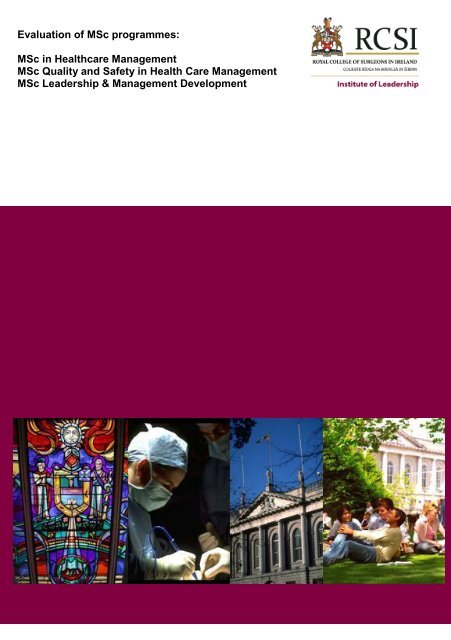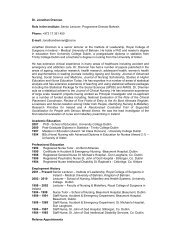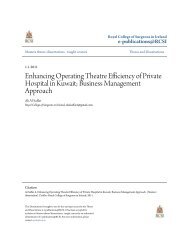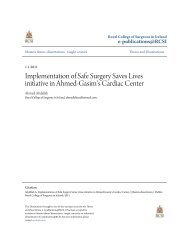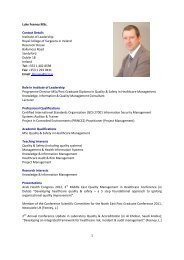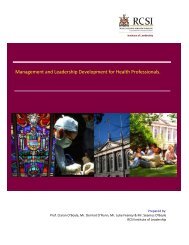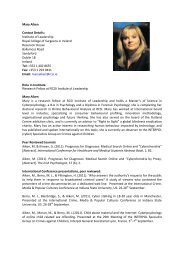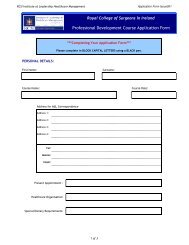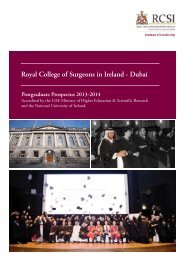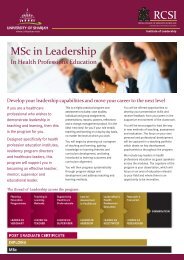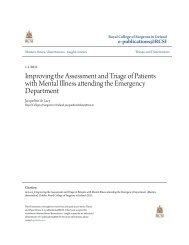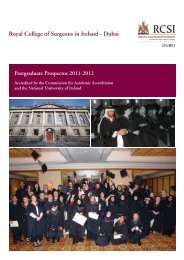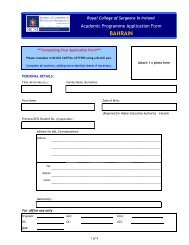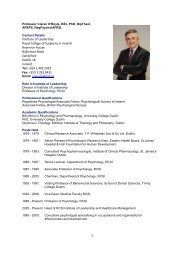Evaluation of MSc programmes: MSc in Healthcare Management ...
Evaluation of MSc programmes: MSc in Healthcare Management ...
Evaluation of MSc programmes: MSc in Healthcare Management ...
Create successful ePaper yourself
Turn your PDF publications into a flip-book with our unique Google optimized e-Paper software.
<strong>Evaluation</strong> <strong>of</strong> <strong>MSc</strong> <strong>programmes</strong>:<br />
<strong>MSc</strong> <strong>in</strong> <strong>Healthcare</strong> <strong>Management</strong><br />
<strong>MSc</strong> Quality and Safety <strong>in</strong> Health Care <strong>Management</strong><br />
<strong>MSc</strong> Leadership & <strong>Management</strong> Development<br />
1
An <strong>Evaluation</strong> <strong>of</strong> <strong>MSc</strong> <strong>in</strong> <strong>Healthcare</strong> <strong>Management</strong>, <strong>MSc</strong> Quality and Safety <strong>in</strong> Health<br />
Care <strong>Management</strong>, <strong>MSc</strong> Leadership & <strong>Management</strong> Development Programmes at<br />
the Institute <strong>of</strong> Leadership, Royal College <strong>of</strong> Surgeons <strong>in</strong> Ireland.<br />
Prepared by<br />
Dr. Jonathan Drennan & Dr. Paul<strong>in</strong>e Joyce<br />
Institute <strong>of</strong> Leadership<br />
Royal College <strong>of</strong> Surgeons <strong>in</strong> Ireland<br />
April 2012<br />
2
1.1 Introduction<br />
This report outl<strong>in</strong>es the f<strong>in</strong>d<strong>in</strong>gs from an educational evaluation that<br />
comprehensively measured the impact that masters’ degrees <strong>in</strong> healthcare<br />
management, leadership & management development and quality and safety <strong>in</strong><br />
healthcare management had on graduates who completed the <strong>programmes</strong> at<br />
the Institute <strong>of</strong> Leadership, Royal College <strong>of</strong> Surgeons (RCSI) <strong>in</strong> Ireland. The<br />
results presented here <strong>in</strong>clude graduates’ evaluation <strong>of</strong> the quality <strong>of</strong> their<br />
course, the extent to which graduates reported the development <strong>of</strong> leadership,<br />
management and generic capabilities and, the impact the master’s programme<br />
had on graduates’ subsequent careers. The participants <strong>in</strong> this study were<br />
graduates who completed a <strong>MSc</strong> <strong>in</strong> <strong>Healthcare</strong> <strong>Management</strong>, <strong>MSc</strong> <strong>in</strong> Leadership<br />
and <strong>Management</strong> Development or <strong>MSc</strong> <strong>in</strong> Quality and Safety <strong>in</strong> <strong>Healthcare</strong><br />
<strong>Management</strong>. These <strong>programmes</strong> have been delivered at RCSI s<strong>in</strong>ce 2005 with<br />
the first graduates <strong>in</strong> 2007. The first section <strong>of</strong> the evaluation reports on the<br />
methods used to evaluate the masters’ <strong>programmes</strong> at the Institute <strong>of</strong><br />
Leadership. This is followed by the presentation <strong>of</strong> the results which <strong>in</strong>cludes:<br />
the demographic pr<strong>of</strong>ile <strong>of</strong> the sample, the results from the survey that measured<br />
graduates’ experience <strong>of</strong> their programme <strong>of</strong> study, the extent to which<br />
graduates made ga<strong>in</strong>s <strong>in</strong> the development <strong>of</strong> leadership capabilities and, f<strong>in</strong>ally,<br />
the employment dest<strong>in</strong>ation <strong>of</strong> graduates follow<strong>in</strong>g the completion <strong>of</strong> the<br />
programme.<br />
1.2 Methods<br />
The evaluation is pr<strong>in</strong>cipally concerned with measur<strong>in</strong>g the quality <strong>of</strong> the<br />
programme and the educational and pr<strong>of</strong>essional outcomes achieved by<br />
graduates as a consequence <strong>of</strong> the programme. In this study outcomes are<br />
classified as short to medium term outcomes and longer-term impacts. Short to<br />
medium term outcomes <strong>in</strong>cluded students satisfaction with their programme <strong>of</strong><br />
study, academic achievement, the development <strong>of</strong> generic capabilities<br />
(graduates’ ability to tackle unfamiliar problems, work as a member <strong>of</strong> a team,<br />
3
develop problem-solv<strong>in</strong>g, analytical and written communication skills), the<br />
development <strong>of</strong> graduate qualities (motivation toward lifelong learn<strong>in</strong>g, the<br />
ability to value perspectives other than their own, the ability to <strong>in</strong>vestigate new<br />
ideas), the impact <strong>of</strong> the educational programme on pr<strong>of</strong>essional practice and<br />
the development <strong>of</strong> leadership capabilities. The measurement <strong>of</strong> longer-term<br />
outcomes <strong>in</strong>cluded the impact <strong>of</strong> the programme on the graduates’ employment.<br />
This section outl<strong>in</strong>es the methods that were used to measure these outcomes.<br />
1.2.1 Aims <strong>of</strong> the <strong>Evaluation</strong><br />
The aims <strong>of</strong> this evaluation were: 1) to evaluate the quality <strong>of</strong> the masters’<br />
<strong>programmes</strong> delivered by the Institute <strong>of</strong> Leadership at RCSI and; 2) to measure<br />
the outcomes that occurred <strong>in</strong> graduates follow<strong>in</strong>g the completion <strong>of</strong> their<br />
programme <strong>of</strong> study.<br />
1.2.2 Sample<br />
The participants <strong>in</strong> this study were graduates who completed a <strong>MSc</strong> <strong>in</strong><br />
<strong>Healthcare</strong> <strong>Management</strong>, <strong>MSc</strong> <strong>in</strong> Leadership and <strong>Management</strong> Development or<br />
<strong>MSc</strong> <strong>in</strong> Quality and Safety <strong>in</strong> <strong>Healthcare</strong> <strong>Management</strong> from the Institute <strong>of</strong><br />
Leadership, Royal College <strong>of</strong> Surgeons <strong>in</strong> Ireland (RCSI). All graduates were<br />
contacted by e-mail <strong>in</strong>form<strong>in</strong>g <strong>of</strong> them <strong>of</strong> the study and <strong>in</strong>vit<strong>in</strong>g them to<br />
participate. Students who had deferred or did not complete their degree were<br />
excluded from the survey. At the time <strong>of</strong> the study there were 303 graduates<br />
from Dubl<strong>in</strong>. 195 <strong>of</strong> these were surveyed for this study and the response was 102<br />
(52.3%).<br />
1.2.3 Measures<br />
The follow<strong>in</strong>g <strong>in</strong>struments and variables were to evaluate the outcomes<br />
associated with the masters degrees: the Course Experience Questionnaire and<br />
the Extended Course Experience Questionnaire, the Master’s Outcomes <strong>Evaluation</strong><br />
Questionnaire and sociodemographic variables.<br />
1.2.3.1 Course Experience Questionnaire (CEQ) and the Extended Course<br />
Experience Questionnaire (ECEQ)<br />
4
Graduates’ experiences <strong>of</strong> their master’s programme were measured us<strong>in</strong>g both<br />
the Course Experience Questionnaire (CEQ) and a number <strong>of</strong> scales that comprise<br />
the Extended Course Experience Questionnaire (ECEQ). The purpose <strong>of</strong> the CEQ is<br />
to evaluate graduates’ perceptions <strong>of</strong> the quality <strong>of</strong> the courses they completed at<br />
college and the extent to which they perceive they have developed generic skills<br />
(A<strong>in</strong>ley and Johnson 2000, McInnis et al. 2001). The value <strong>of</strong> the CEQ is that it<br />
gives a broad perspective on outcomes by focus<strong>in</strong>g on graduates’ perceptions <strong>of</strong><br />
their courses rather than on students’ evaluations <strong>of</strong> particular lecturers. The<br />
CEQ also exam<strong>in</strong>es <strong>in</strong>dicators <strong>of</strong> relative performance <strong>in</strong> higher education at both<br />
system and <strong>in</strong>stitutional levels (McInnis et al. 2001). Theories <strong>of</strong> teach<strong>in</strong>g and<br />
learn<strong>in</strong>g <strong>in</strong>formed the development <strong>of</strong> the CEQ (Ramsden 1991, A<strong>in</strong>ley and<br />
Johnson 2000). Its ma<strong>in</strong> strength is that the <strong>in</strong>strument enables the researcher to<br />
l<strong>in</strong>k students’ perceptions <strong>of</strong> the quality <strong>of</strong> a programme to learn<strong>in</strong>g outcomes. In<br />
test<strong>in</strong>g it has been shown to be a reliable and valid <strong>in</strong>strument. It has also been<br />
claimed to be valuable <strong>in</strong> ‘improv<strong>in</strong>g the quality <strong>of</strong> teach<strong>in</strong>g <strong>in</strong> universities and<br />
also for <strong>in</strong>form<strong>in</strong>g student choice, manag<strong>in</strong>g <strong>in</strong>stitutional performance, and<br />
promot<strong>in</strong>g accountability <strong>of</strong> the higher education sector’ (McInnis et al. 2001, pg.<br />
3). The CEQ <strong>in</strong>strument has undergone progressive ref<strong>in</strong>ement, development<br />
and test<strong>in</strong>g over the last twenty years culm<strong>in</strong>at<strong>in</strong>g <strong>in</strong> the recent development <strong>of</strong><br />
an Extended Course Experience Questionnaire (Griff<strong>in</strong> et al. 2003).<br />
In its orig<strong>in</strong>al form the CEQ was found to be a reliable and valid <strong>in</strong>strument that<br />
identified the quality <strong>of</strong> teach<strong>in</strong>g <strong>in</strong> different academic departments and<br />
<strong>in</strong>stitutions (Ramsden 1991). However, the orig<strong>in</strong>al CEQ <strong>in</strong>strument was deemed<br />
to be lack<strong>in</strong>g <strong>in</strong> its ability to capture the wider aspects <strong>of</strong> the student experience<br />
<strong>in</strong> higher education <strong>in</strong>clud<strong>in</strong>g the impact <strong>of</strong> a higher education programme on<br />
student outcomes. Therefore to comprehensively capture the experience <strong>of</strong><br />
students at university, <strong>in</strong> addition to the current scales on the CEQ (Good<br />
Teach<strong>in</strong>g Scale; Clear Goals and Standards Scale; Appropriate Assessment Scale;<br />
Appropriate workload Scale and Generic skills Scale), five further scales were<br />
recommended to extend the <strong>in</strong>strument. These new scales <strong>in</strong>cluded the Student<br />
Support Scale, Learn<strong>in</strong>g Resources Scale, Learn<strong>in</strong>g Community Scale, Intellectual<br />
5
Motivation Scale and Graduate Qualities Scale. These additional <strong>in</strong>struments<br />
expanded the <strong>in</strong>strument from a 23-item questionnaire to a 50-item<br />
questionnaire with the addition <strong>of</strong> five scales (see table 1).<br />
Table 1 Def<strong>in</strong><strong>in</strong>g Items <strong>of</strong> the CEQ and Extended CEQ Scales (Adapted from Ramsden 1991,<br />
McInnis et al. 2001, Griff<strong>in</strong> et al. 2003)<br />
Scale<br />
Def<strong>in</strong><strong>in</strong>g Item<br />
† Good Teach<strong>in</strong>g* Teach<strong>in</strong>g staff here normally give helpful feedback on how you are go<strong>in</strong>g<br />
† Clear Goals and<br />
Standards*<br />
† Appropriate<br />
Workload*<br />
† Appropriate<br />
Assessment*<br />
I usually had a clear idea <strong>of</strong> where I was go<strong>in</strong>g and what was expected <strong>of</strong><br />
me <strong>in</strong> this course.<br />
The sheer volume <strong>of</strong> work to be got through <strong>in</strong> this course meant it<br />
couldn't all be thoroughly comprehended.<br />
The staff seemed more <strong>in</strong>terested <strong>in</strong> test<strong>in</strong>g what I had memorised than<br />
what I had understood.<br />
† Generic Skills* The course developed my problem solv<strong>in</strong>g skills<br />
‡ Student Support<br />
(5 items)<br />
‡ Learn<strong>in</strong>g Resources<br />
(5 items)<br />
‡ Learn<strong>in</strong>g<br />
Community*<br />
(5 items)<br />
‡ Intellectual<br />
Motivation*<br />
(4 items)<br />
Relevant learn<strong>in</strong>g resources were accessible when I needed them<br />
It was made clear what resources were available to help me learn<br />
I felt I belonged to the university community<br />
I found my studies <strong>in</strong>tellectually stimulat<strong>in</strong>g<br />
‡ Graduate Qualities* The course developed my confidence to <strong>in</strong>vestigate new ideas<br />
(6 items)<br />
† Orig<strong>in</strong>al CEQ scales. ‡ Extended CEQ Scales *Scales used <strong>in</strong> this study<br />
The purpose <strong>of</strong> us<strong>in</strong>g the CEQ <strong>in</strong> this study is to identify the quality <strong>of</strong> the core<br />
aspects <strong>of</strong> teach<strong>in</strong>g and learn<strong>in</strong>g that students experienced dur<strong>in</strong>g their master’s<br />
programme (A<strong>in</strong>ley & Johnson 2000). The CEQ is identified as be<strong>in</strong>g particularly<br />
valid for the evaluation <strong>of</strong> coursework master’s <strong>programmes</strong> <strong>in</strong> healthcare<br />
management and quality as students are exposed to a wide variety <strong>of</strong> subjects,<br />
come <strong>in</strong>to contact with a variety <strong>of</strong> lecturers and experience a variety <strong>of</strong><br />
educational experiences. The validity and utility <strong>of</strong> the CEQ has resulted <strong>in</strong> its<br />
widespread use as an <strong>in</strong>dicator <strong>of</strong> quality and student outcomes.<br />
6
Students were asked to rate their level <strong>of</strong> agreement or disagreement on a fivepo<strong>in</strong>t<br />
scale on 39-items that comprised eight scales <strong>of</strong> the CEQ and the ECEQ. The<br />
eight scales used <strong>in</strong> this study <strong>in</strong>cluded: the Good Teach<strong>in</strong>g Scale, Clear Goals and<br />
Standards Scale, Appropriate Workload Scale, Generic Skills Scale, Learn<strong>in</strong>g<br />
Community Scale, Intellectual Motivation Scale and the Graduate Quality Scale.<br />
1.2.3.2 Master’s Outcomes <strong>Evaluation</strong> Questionnaire<br />
Outcomes related to leadership and management were measured us<strong>in</strong>g an<br />
<strong>in</strong>strument developed specifically for this evaluation: the Masters Outcomes<br />
<strong>Evaluation</strong> Questionnaire (MOEQ). The items on the subscale were identified and<br />
developed from an extensive review <strong>of</strong> the literature and course documentation<br />
perta<strong>in</strong><strong>in</strong>g to leadership outcomes <strong>in</strong> healthcare management. The questionnaire<br />
consisted <strong>of</strong> 31-items measur<strong>in</strong>g four doma<strong>in</strong>s seen as relevant to leadership and<br />
management practice: 1) ability to change pr<strong>of</strong>essional practice (9 items); 2)<br />
leadership capabilities (6 items); 3) communication and teamwork (6 items) and;<br />
3) problem solv<strong>in</strong>g (10 items).<br />
The MOEQ was designed to <strong>in</strong>corporate a retrospective pre-test design. Students<br />
were asked firstly to rate their ability follow<strong>in</strong>g their master’s programme (posttest)<br />
and then to th<strong>in</strong>k back and rate their ability before the commencement <strong>of</strong><br />
their master’s programme (retrospective pre-test/then-test) on a seven-po<strong>in</strong>t<br />
scale that was anchored by 1 = low understand<strong>in</strong>g/ability to 7 = high<br />
understand<strong>in</strong>g/ability. The rationale for us<strong>in</strong>g this approach was to account for<br />
the confound<strong>in</strong>g factor <strong>of</strong> response-shift bias and to identify whether the<br />
outcomes were be<strong>in</strong>g achieved as a consequence <strong>of</strong> the programme or were due<br />
to other <strong>in</strong>fluence such as <strong>in</strong>-service education, further education, maturation or<br />
employment (Drennan & Hyde 2008).<br />
Table 2 Def<strong>in</strong><strong>in</strong>g Items <strong>of</strong> the Masters <strong>in</strong> Nurs<strong>in</strong>g Outcomes <strong>Evaluation</strong> Questionnaire Scales<br />
Scale<br />
Def<strong>in</strong><strong>in</strong>g Items<br />
Change Pr<strong>of</strong>essional<br />
Ability to change and <strong>in</strong>fluence practice<br />
Practice<br />
Leadership<br />
Communication and<br />
Teamwork<br />
Ability to use leadership theories to <strong>in</strong>form pr<strong>of</strong>essional practice<br />
Ability to communicate and work as a member <strong>of</strong> a team<br />
7
Problem Solv<strong>in</strong>g<br />
Ability to develop solutions to practice problems through <strong>in</strong>quiry<br />
analysis and <strong>in</strong>terpretation<br />
1.2.3.3 Measurement <strong>of</strong> Sociodemographic, Pr<strong>of</strong>essional and Educational Variables<br />
To test for relationships with the dependent variables (outcome measures) a<br />
number <strong>of</strong> Sociodemographic, pr<strong>of</strong>essional and educational variables will also be<br />
measured (see table 3).<br />
Table 3 Sociodemographic, Pr<strong>of</strong>essional and Educational Variables Measured<br />
Sociodemographic Pr<strong>of</strong>essional Variables Educational Variables<br />
Variables<br />
Age Current area <strong>of</strong> work Strand (<strong>Healthcare</strong> management/Quality)<br />
Gender Grade (promotion) Academic qualifications<br />
Site at which degree<br />
completed<br />
Employment dur<strong>in</strong>g masters<br />
(full-time/part-time/none)<br />
F<strong>in</strong>al award<br />
Hours spent on study/writ<strong>in</strong>g (workload)<br />
1.2.4 Procedure<br />
The evaluation survey was delivered onl<strong>in</strong>e us<strong>in</strong>g the web-based onl<strong>in</strong>e survey<br />
system, SurveyMonkey (www.surveymonkey.com). As <strong>in</strong> best practice with<br />
surveys, participants were sent up to four rem<strong>in</strong>ders to complete the<br />
questionnaire.<br />
1.2.5 Ethical Issues<br />
Access and ethical approval was granted from the ethics committees at RCSI.<br />
1.2.6 Data Analysis<br />
Data obta<strong>in</strong>ed was analysed by computer us<strong>in</strong>g the Statistical Package for the<br />
Social Sciences (SPSS version 18.0). Both descriptive and <strong>in</strong>ferential statistics<br />
were used <strong>in</strong> the analysis and description <strong>of</strong> the data set. To ascerta<strong>in</strong> the specific<br />
differences between students rat<strong>in</strong>gs <strong>of</strong> their ability at the end <strong>of</strong> the course<br />
(post-test) compared with their ability at the beg<strong>in</strong>n<strong>in</strong>g <strong>of</strong> the course (then-test)<br />
Wilcox on signed rank test was used.<br />
8
1.3 Results<br />
The demographic pr<strong>of</strong>ile <strong>of</strong> the sample that completed the evaluation <strong>of</strong> the<br />
<strong>programmes</strong> at RCSI <strong>in</strong> Dubl<strong>in</strong> is outl<strong>in</strong>ed <strong>in</strong> table 4.<br />
Table 4 Demographic, Academic and Pr<strong>of</strong>essional Pr<strong>of</strong>ile <strong>of</strong> Master’s Graduates<br />
Characteristic<br />
Age <strong>in</strong> Years M, (SD) 39.1 (8.0)<br />
Gender (%)<br />
Female 88.1<br />
Male 11.9<br />
Year Degree Completed (%)<br />
2007 6.7<br />
2008 6.7<br />
2009 37.8<br />
2010 22.2<br />
2011 26.7<br />
Strand Degree Completed (%)<br />
<strong>MSc</strong> <strong>in</strong> <strong>Healthcare</strong> <strong>Management</strong><br />
<strong>MSc</strong> <strong>in</strong> Leadership & <strong>Management</strong> Development<br />
<strong>MSc</strong> <strong>in</strong> Quality and Safety <strong>in</strong> <strong>Healthcare</strong> <strong>Management</strong> 6<br />
63.8<br />
29.8<br />
1.3.1 Graduates’ <strong>Evaluation</strong> <strong>of</strong> the Quality <strong>of</strong> their Educational Programme<br />
This section reports on the results <strong>of</strong> the Course Experience Questionnaire (CEQ)<br />
and the Extended Course Experience Questionnaire, which were used to evaluate<br />
graduates’ perceptions <strong>of</strong> the quality <strong>of</strong> the courses and the extent to which they<br />
developed a number <strong>of</strong> generic and graduate capabilities. The results <strong>in</strong> this<br />
section are reported <strong>in</strong> relation to students’ perceptions <strong>of</strong> the quality <strong>of</strong><br />
teach<strong>in</strong>g, the extent to which they were provided with clear goals and standards,<br />
the appropriateness <strong>of</strong> workload, the appropriateness <strong>of</strong> assessment, graduates’<br />
overall satisfaction with the course and the development <strong>of</strong> generic skills. The<br />
Extended Course Experience Questionnaire, used <strong>in</strong> conjunction with the CEQ,<br />
measured graduates’ perceptions <strong>of</strong> their <strong>in</strong>tegration <strong>in</strong>to the learn<strong>in</strong>g<br />
community <strong>of</strong> the Institute, the extent to which they were <strong>in</strong>tellectually<br />
motivated by the programme <strong>of</strong> study and the development <strong>of</strong> graduate qualities.<br />
The results are presented <strong>in</strong> relation to the <strong>in</strong>dividual items that comprise each<br />
<strong>of</strong> the scales <strong>of</strong> the CEQ and Extended CEQ and then <strong>in</strong> relation to each <strong>of</strong> the<br />
summated scale scores. To aid <strong>in</strong>terpretation and standardise scores across the<br />
CEQ and the Extended CEQ the mean item scores <strong>in</strong> the tables and figures are<br />
based on a l<strong>in</strong>ear transformation where the 1 to 5 categories (strongly disagree<br />
9
to strongly agree) have been recoded from -100 to +100. Positive values <strong>in</strong>dicate<br />
degrees <strong>of</strong> agreement and negative values <strong>in</strong>dicate degrees <strong>of</strong> disagreement with<br />
each <strong>of</strong> the items. For further ease <strong>of</strong> <strong>in</strong>terpretation, overall agreement on each<br />
item is reported by comb<strong>in</strong><strong>in</strong>g agree and strongly agree categories.<br />
1.3.1.1 Graduates’ Overall <strong>Evaluation</strong> <strong>of</strong> their Programme <strong>of</strong> Study– Item Scores on<br />
the CEQ<br />
Graduates rated the development <strong>of</strong> generic capabilities as the greatest impact<br />
and outcome <strong>of</strong> their master’s degree. Graduates reported that they had atta<strong>in</strong>ed<br />
a number <strong>of</strong> generic capabilities <strong>in</strong>clud<strong>in</strong>g the ability to communicate <strong>in</strong> writ<strong>in</strong>g,<br />
the development <strong>of</strong> analytical skills, problem-solv<strong>in</strong>g, the ability to tackle<br />
unfamiliar problems and their ability to work as a member <strong>of</strong> a team (table 5).<br />
Students also reported that they atta<strong>in</strong>ed relatively high levels <strong>of</strong> ability <strong>in</strong><br />
relation to their ability to plan their own work.<br />
Graduates also highly rated the majority <strong>of</strong> their experiences <strong>of</strong> teach<strong>in</strong>g, with<br />
the vast majority <strong>in</strong> agreement that lecturers made their subjects <strong>in</strong>terest<strong>in</strong>g,<br />
were good at expla<strong>in</strong><strong>in</strong>g subjects; graduates also perceived that lecturers<br />
motivated students to do their best work. Graduates were positive regard<strong>in</strong>g the<br />
feedback received from teach<strong>in</strong>g staff on how they were do<strong>in</strong>g on the<br />
programme with the majority agree<strong>in</strong>g that staff made a real effort to<br />
understand the difficulties they might be hav<strong>in</strong>g with their work. Students also<br />
reported that they were appropriately assessed and that the programme did not<br />
emphasise lower order assessment skills such as factual recall and a reliance on<br />
memory. The item ‘the sheer volume <strong>of</strong> work to be got through <strong>in</strong> this course<br />
meant it couldn’t be thoroughly comprehended’ was the only negatively rated<br />
item on the scale. This <strong>in</strong>dicated there was variability <strong>in</strong> the extent to which<br />
graduates perceived they had the time to assimilate the content <strong>of</strong> the course. In<br />
addition the item ‘the workload was too heavy’, although positively rated, was<br />
rated relatively lower than other aspects <strong>of</strong> the programme. However, <strong>in</strong> relation<br />
to workload, graduates did perceive that they were given time to understand the<br />
content <strong>of</strong> the course. Graduates also highly rated the organisation <strong>of</strong> the course<br />
10
and all items related to the measurement <strong>of</strong> clear gals and expectations were<br />
positively rated.<br />
Percentage agreement was also used to summarise item responses by comb<strong>in</strong><strong>in</strong>g<br />
agree and strongly agree categories <strong>in</strong>to one overall agreement category (table<br />
5). The highest level <strong>of</strong> agreement (86.7%) was related to the item: ‘The course<br />
sharpened my analytical skills’. High levels <strong>of</strong> agreement were also associated<br />
with other generic skill items <strong>in</strong>clud<strong>in</strong>g development <strong>of</strong> problem-solv<strong>in</strong>g skills<br />
(82.2%), the development <strong>of</strong> capabilities <strong>in</strong> written communication (80.0%) and<br />
the ability to tackle unfamiliar problems (68.8%). The quality <strong>of</strong> teach<strong>in</strong>g was<br />
also highly rated. Over eighty per cent <strong>of</strong> graduates reported that lecturers were<br />
‘extremely good at expla<strong>in</strong><strong>in</strong>g th<strong>in</strong>gs’ and that they were motivated to do their<br />
best work. Graduates were also <strong>in</strong> agreement that teach<strong>in</strong>g staff made a real<br />
effort to understand the difficulties they may hav<strong>in</strong>g with their work (68.9%)<br />
and that lecturers worked hard to make their subjects <strong>in</strong>terest<strong>in</strong>g (69.0%).<br />
Graduates agreed or strongly agreed (63.8%) that teach<strong>in</strong>g staff normally gave<br />
helpful feedback on the work submitted.<br />
Graduates strongly agreed that they were provided with clear goals and<br />
expectations. In particular 82.3% <strong>of</strong> graduates were <strong>of</strong> the op<strong>in</strong>ion that ‘the staff<br />
made it clear what they expected from students’. Two thirds were also <strong>in</strong><br />
agreement that they had a clear idea where they were go<strong>in</strong>g and what was<br />
expected from them on the course with approximately half <strong>of</strong> the respondents<br />
report<strong>in</strong>g that they knew the standard <strong>of</strong> work expected.<br />
Responses to the level <strong>of</strong> workload expected were variable. Generally, the<br />
majority <strong>of</strong> students were happy with elements that measured workload<br />
throughout the programme with over sixty per cent report<strong>in</strong>g that they were<br />
provided with enough time to understand the th<strong>in</strong>gs they had to learn. However,<br />
seventy-five per cent reported that the volume <strong>of</strong> work meant it could not be<br />
thoroughly comprehended. However, the vast majority <strong>of</strong> graduates did not<br />
perceive that the ‘the workload was too heavy’. One item was used to measure<br />
overall satisfaction with the quality <strong>of</strong> the programme <strong>of</strong> study; the vast majority<br />
11
<strong>of</strong> graduates (66.0 %) were <strong>in</strong> agreement that they were satisfied with the<br />
overall quality <strong>of</strong> their course.<br />
12
Table 5 Item Scores* and Percentage Agreement † on the CEQ<br />
CEQ Scale/Item Item Scores Percentage<br />
Agreement †<br />
Mean* SD<br />
Good Teach<strong>in</strong>g<br />
The teach<strong>in</strong>g staff normally gave me helpful feedback on how 55.5 28.6 63.8<br />
I was do<strong>in</strong>g<br />
The staff made a real effort to understand the difficulties I 35.5 36.3 68.9<br />
might be hav<strong>in</strong>g with my work<br />
My lecturers were extremely good at expla<strong>in</strong><strong>in</strong>g th<strong>in</strong>gs 44.4 34.0 84.4<br />
The staff put a lot <strong>of</strong> time <strong>in</strong>to comment<strong>in</strong>g on my work 11.1 51.0 37.7<br />
The teach<strong>in</strong>g staff motivated me to do my best work 52.2 42.5 80.1<br />
The teach<strong>in</strong>g staff worked hard to make their subjects<br />
38.8 43.8 69.0<br />
<strong>in</strong>terest<strong>in</strong>g<br />
Appropriate Workload<br />
The workload was too heavy 7.8 38.3 22.2<br />
The sheer volume <strong>of</strong> work to be got through <strong>in</strong> this course -44.3 36.2 75.0<br />
meant it couldn’t be thoroughly comprehended<br />
I was generally given enough time to understand the th<strong>in</strong>gs I 32.2 47.8 62.2<br />
had to learn<br />
There was a lot <strong>of</strong> pressure on me to do well <strong>in</strong> this course 32.2 46.6 15.6<br />
Clear Goals and Expectations<br />
It was always easy to know the standard <strong>of</strong> work expected 11.1 49.8 48.8<br />
I usually had clear idea <strong>of</strong> where I was go<strong>in</strong>g and what was 27.7 56.6 66.7<br />
expected <strong>of</strong> me on this course<br />
It was <strong>of</strong>ten hard to discover what was expected <strong>of</strong> me on 33.3 44.3 27.2<br />
this course<br />
The staff made it clear from the start what they expected 55.5 42.9 82.3<br />
from students<br />
Generic Skills<br />
As a result <strong>of</strong> my course I feel confident about tackl<strong>in</strong>g<br />
44.4 51.5 68.8<br />
unfamiliar problems<br />
The course helped me develop my ability to work as a team 42.2 46.4 64.5<br />
member<br />
The course developed my problem solv<strong>in</strong>g skills 47.7 49.8 82.2<br />
The course sharpened my analytical skills 51.1 31.0 86.7<br />
The course improved my skills <strong>in</strong> written communication 55.5 38.7 80.0<br />
My course helped my ability to plan my own work 22.2 48.3 46.7<br />
Appropriate Assessment<br />
Too many staff asked me questions just about facts 6.66 22.8 26.7<br />
To do well <strong>in</strong> this course all you really needed was a good 57.7 38.3 4.4<br />
memory<br />
The staff seemed more <strong>in</strong>terested <strong>in</strong> test<strong>in</strong>g what I had<br />
51.1 48.4 8.9<br />
memorised than what I had understood<br />
Overall Satisfaction<br />
Overall I was satisfied with the quality <strong>of</strong> this course 35.5 48.8 66.0<br />
*Scores range from – 100 to + 100. Positive scores <strong>in</strong>dicate levels <strong>of</strong> agreement; negative scores<br />
<strong>in</strong>dicate levels <strong>of</strong> disagreement.<br />
† Overall percentage agree<strong>in</strong>g or strongly agree<strong>in</strong>g on a 5-po<strong>in</strong>t scale.<br />
13
1.3.1.2 Student Experience <strong>of</strong> the Master’s Programmes – Item Scores on the<br />
Extended CEQ<br />
Analysis <strong>of</strong> the items that comprise the three extended CEQ scales was also<br />
undertaken to identify the level <strong>of</strong> <strong>in</strong>tellectual motivation reported by students,<br />
the extent to which students reported that they were <strong>in</strong>tegrated <strong>in</strong>to the learn<strong>in</strong>g<br />
community <strong>of</strong> the Institute <strong>of</strong> Leadership and the extent to which they perceived<br />
they had developed a number <strong>of</strong> graduate qualities (table 6). The highest level <strong>of</strong><br />
satisfaction related to the items that comprised the <strong>in</strong>tellectual motivation and<br />
the graduate qualities scales. In the <strong>in</strong>tellectual motivation scale the highest item<br />
scores related to the items: ‘I found the course motivat<strong>in</strong>g’, ‘I found my studies<br />
<strong>in</strong>tellectually stimulat<strong>in</strong>g’, ‘overall my university experience was worthwhile’. In<br />
the graduate qualities scale the items: ‘I consider what I learned valuable for my<br />
future’, ‘the course provided me with a broad overview <strong>of</strong> my field <strong>of</strong> knowledge’,<br />
‘the course developed my confidence to <strong>in</strong>vestigate new ideas’ and, <strong>in</strong> particular,<br />
‘I learned to apply the pr<strong>in</strong>ciples from this course to new situations’ were also<br />
highly rated. Graduates also highly rated items related to the learn<strong>in</strong>g<br />
community scale. In particular, graduates reported that they felt ‘part <strong>of</strong> a group<br />
<strong>of</strong> students and staff committed to learn<strong>in</strong>g’ and that they felt they ‘belonged to<br />
the university community’.<br />
In relation to percentage agreement for each <strong>of</strong> the items (a comb<strong>in</strong>ation <strong>of</strong> agree<br />
and strongly agree responses), the highest percentage agreement related to the<br />
items on the graduate qualities scales and <strong>in</strong>tellectual motivation scales. The<br />
item ‘Overall my university experience was worthwhile’ received the highest<br />
level <strong>of</strong> agreement at approximately n<strong>in</strong>ety-four per cent. Students were also <strong>in</strong><br />
agreement that the course was motivat<strong>in</strong>g, stimulat<strong>in</strong>g and worthwhile. Similar<br />
levels <strong>of</strong> agreement were identified <strong>in</strong> the items that comprised the graduate<br />
qualities scale. This scale measured a number <strong>of</strong> outcomes achieved as a<br />
consequence <strong>of</strong> the programme <strong>of</strong> study. Over n<strong>in</strong>ety-five per cent <strong>of</strong> graduates<br />
reported that they had learned to apply the pr<strong>in</strong>ciples <strong>of</strong> the course to new<br />
situations with n<strong>in</strong>ety-two per cent report<strong>in</strong>g that they had developed the<br />
confidence to <strong>in</strong>vestigate new ideas. These f<strong>in</strong>d<strong>in</strong>gs are further supported by<br />
Joyce (2012) which suggest that education is <strong>in</strong>fluenced by the needs <strong>of</strong><br />
14
postgraduate students to acquire knowledge and skills for application back to<br />
practice. The rema<strong>in</strong>der <strong>of</strong> items that comprised the graduate qualities scale<br />
achieved levels <strong>of</strong> agreement <strong>of</strong> seventy-eight per cent and greater.<br />
Graduates also reported that they felt part <strong>of</strong> a learn<strong>in</strong>g community. Over<br />
seventy per cent <strong>of</strong> respondents were <strong>in</strong> agreement that they felt they belonged<br />
to the university community, that they learned to explore ideas confidently with<br />
others and that they felt part <strong>of</strong> a group <strong>of</strong> students and staff committed to<br />
learn<strong>in</strong>g. The majority <strong>of</strong> students also reported that their ideas and suggestions<br />
were used throughout the programme. The only item that received a relatively<br />
lower rat<strong>in</strong>g at 50% <strong>of</strong> respondents agree<strong>in</strong>g was ‘I learned to explore ideas<br />
confidently with other people’<br />
Table 6 Item Scores* and Percentage Agreement † on the Extended CEQ<br />
CEQ Scale/Item Item Scores Percentage<br />
Agreement †<br />
Mean* SD<br />
Intellectual Motivation<br />
I found my studies <strong>in</strong>tellectually stimulat<strong>in</strong>g 46.5 39.4 70.5<br />
I found the course motivat<strong>in</strong>g 42.2 41.2 80.0<br />
My course has stimulated my <strong>in</strong>terest <strong>in</strong> my field <strong>of</strong> study 18.1 51.8 43.2<br />
Overall my university experience was worthwhile 71.1 31.0 93.3<br />
Learn<strong>in</strong>g Community<br />
I was able to explore academic <strong>in</strong>terests with staff and<br />
students<br />
41.8 46.2 74.4<br />
I felt part <strong>of</strong> a group <strong>of</strong> students and staff committed to 40.9 30.7 75.0<br />
learn<strong>in</strong>g<br />
I learned to explore ideas confidently with other people 17.0 54.9 50.0<br />
I felt I belonged to the university community 50.0 28.2 84.5<br />
Students’ ideas and suggestions were used dur<strong>in</strong>g the 50.1 36.9 82.2<br />
course<br />
Graduate Qualities<br />
My university experience encouraged me to value<br />
perspectives other than my own<br />
47.7 41.2 77.7<br />
I consider what I learned valuable for my future 54.4 39.6 82.2<br />
The course developed my confidence to <strong>in</strong>vestigate new 62.2 40.1 91.1<br />
ideas<br />
I learned to apply the pr<strong>in</strong>ciples from this course to new 67.7 28.5 95.6<br />
situations<br />
The course provided me with a broad overview <strong>of</strong> my field<br />
83.8<br />
<strong>of</strong> knowledge<br />
University stimulated my enthusiasm for further learn<strong>in</strong>g 52.2 31.9 82.2<br />
*Scores range from – 100 to + 100. Positive scores <strong>in</strong>dicate levels <strong>of</strong> agreement; negative scores<br />
<strong>in</strong>dicate levels <strong>of</strong> disagreement.<br />
† Overall percentage agree<strong>in</strong>g or strongly agree<strong>in</strong>g on a 5-po<strong>in</strong>t scale.<br />
1.3.1.3 Scale Responses to the Course Experience Questionnaire and the Extended<br />
Course Experience Questionnaire<br />
15
The items that comprise the CEQ and the Extended CEQ were summated <strong>in</strong>to six<br />
scales, which measured the overall student experience <strong>of</strong> teach<strong>in</strong>g, workload,<br />
goals and expectations, the development <strong>of</strong> generic skills, appropriate<br />
assessment, <strong>in</strong>tellectual motivation, belong<strong>in</strong>g to a learn<strong>in</strong>g community and the<br />
development <strong>of</strong> graduate qualities as part <strong>of</strong> their course experience. One s<strong>in</strong>gle<br />
item measured overall satisfaction with the programme <strong>of</strong> study (table 7).<br />
Table 7 Mean Scores <strong>of</strong> the CEQ* and Extended CEQ* Scales<br />
Scale M<strong>in</strong>imum Maximum Mean SD<br />
Good Teach<strong>in</strong>g -50.67 66.67 21.11 25.7<br />
Appropriate Workload -37.50 37.50 7.31 21.45<br />
Clear Goals and Expectations -62.50 100.00 31.94 38.11<br />
Generic Skills -33.33 100.00 40.88 29.21<br />
Appropriate Assessment -50.00 100.00 38.51 33.86<br />
Intellectual Motivation -25.00 100.00 43.60 30.17<br />
Learn<strong>in</strong>g Community -10.00 100.00 40.23 29.15<br />
Graduate Qualities -25.00 100.00 56.85 29.37<br />
Overall Satisfaction 0.00 100.00 71.11 31.05<br />
*Scores range from – 100 to + 100. Positive scores <strong>in</strong>dicate levels <strong>of</strong> agreement; negative scores<br />
<strong>in</strong>dicate levels <strong>of</strong> disagreement.<br />
The mean scale scores identified that the development <strong>of</strong> graduate qualities (M =<br />
56.85, SD = 29.37) was the highest outcome identified by students followed by<br />
be<strong>in</strong>g <strong>in</strong>tellectually motivated (M = 43.60, SD = 30.17). A high mean score on the<br />
<strong>in</strong>tellectual motivation scale <strong>in</strong>dicated that graduates found their studies<br />
<strong>in</strong>tellectually stimulat<strong>in</strong>g. A high mean score on the graduate qualities scale<br />
<strong>in</strong>dicated that graduates developed the confidence to <strong>in</strong>vestigate new ideas and<br />
the ability to value perspectives different from their own. The development <strong>of</strong><br />
generic skills (M = 40.88, SD = 29.21) and the extent to which graduates felt part<br />
<strong>of</strong> a learn<strong>in</strong>g community (M = 40.23, SD = 29.15) were also positively rated. A<br />
positive rat<strong>in</strong>g on generic skills scale <strong>in</strong>dicated that graduates were <strong>of</strong> the<br />
op<strong>in</strong>ion that they had developed problem-solv<strong>in</strong>g and analytical skills as an<br />
outcome <strong>of</strong> the programme <strong>of</strong> study; a positive rat<strong>in</strong>g on the learn<strong>in</strong>g community<br />
scale <strong>in</strong>dicated that students felt part <strong>of</strong> the academic environment. Although<br />
the mean scores for the good teach<strong>in</strong>g, clear goals and expectations and<br />
16
appropriate assessment scales were rated relatively lower, graduates still<br />
positively evaluated these aspects <strong>of</strong> their programme. No element <strong>of</strong> the student<br />
experience received an overall negative rat<strong>in</strong>g, however, there was variability on<br />
the scores related to the appropriate workload scale (mean = 7.31, SD = 21.45).<br />
Although this aspect <strong>of</strong> the programme was positively rated, the overall score<br />
was relatively low compared to graduates’ experience <strong>of</strong> other elements <strong>in</strong> the<br />
course. Overall graduates were highly satisfied with the quality <strong>of</strong> their<br />
programme with a very high overall satisfaction mean score <strong>of</strong> 71.11 (SD =<br />
31.05).<br />
1.3.3 Graduate Dest<strong>in</strong>ation<br />
The impact <strong>of</strong> the master’s degree on subsequent promotion was deemed by<br />
graduates to be relatively <strong>in</strong>fluential with over a quarter <strong>of</strong> those who had<br />
changed grade or been promoted to a higher grade s<strong>in</strong>ce complet<strong>in</strong>g their<br />
programme <strong>of</strong> study <strong>in</strong>dicat<strong>in</strong>g that this had occurred as a result <strong>of</strong> hold<strong>in</strong>g a<br />
master’s degree <strong>in</strong> healthcare management <strong>of</strong> quality and safety <strong>in</strong> healthcare<br />
management (see figure 2).<br />
17
Figure 2 Changed job as a consequence <strong>of</strong> the Master’s programme<br />
1.4 Conclusion<br />
The evaluation <strong>of</strong> the masters’ <strong>programmes</strong> at RCSI Dubl<strong>in</strong> identified that the<br />
experience <strong>of</strong> study<strong>in</strong>g at master’s level was <strong>of</strong> a high quality. Graduates also<br />
reported that they had developed a number <strong>of</strong> generic, management and<br />
leadership and critical th<strong>in</strong>k<strong>in</strong>g capabilities and as a consequence <strong>of</strong> the<br />
programme. Generic capabilities achieved <strong>in</strong>cluded problem-solv<strong>in</strong>g skills,<br />
analytical ability, the ability to plan work, and the ability to communicate at a<br />
high level. Graduate capabilities <strong>in</strong>cluded the confidence to <strong>in</strong>vestigate new ideas<br />
and the ability to apply the pr<strong>in</strong>ciples <strong>of</strong> the course to new situations as well as a<br />
commitment to lifelong learn<strong>in</strong>g. Graduates were positive about the organisation<br />
<strong>of</strong> the programme, the standard <strong>of</strong> teach<strong>in</strong>g, the feedback from the teachers and<br />
the methods <strong>of</strong> assessment. Graduates also reported that they were <strong>in</strong>volved <strong>in</strong><br />
the life <strong>of</strong> the College and that the <strong>programmes</strong> were <strong>in</strong>tellectually stimulat<strong>in</strong>g.<br />
In summary the <strong>programmes</strong> at RCSI, measured us<strong>in</strong>g reliable and valid<br />
educational outcome <strong>in</strong>struments, were highly evaluated. Overall students<br />
reported high levels <strong>of</strong> satisfaction with their programme <strong>of</strong> study and reported<br />
that the theoretical and practical components <strong>of</strong> the programme have a positive<br />
impact on their pr<strong>of</strong>essional work<strong>in</strong>g lives.<br />
18
References<br />
A<strong>in</strong>ley J., Johnson T. (2000). Course Experience Questionnaire 2000: An Interim<br />
Report Prepared for the Graduate Careers Council <strong>of</strong> Australia. Australian<br />
Council for Educational Research, Canberra.<br />
Drennan J., Hyde A. (2008) Controll<strong>in</strong>g response shift bias: The use <strong>of</strong> the<br />
retrospective pretest design <strong>in</strong> the evaluation <strong>of</strong> a master's programme.<br />
Assessment and <strong>Evaluation</strong> <strong>in</strong> Higher Education, 33 (6):699-709.<br />
Griff<strong>in</strong> P., Coates H., McInnis C., James R. (2003). The development <strong>of</strong> an<br />
extended Course Experience Questionnaire. Quality <strong>in</strong> Higher Education, 9,<br />
(3), 259-266.<br />
Joyce P (2012) Learn<strong>in</strong>g as do<strong>in</strong>g -common goals and <strong>in</strong>terests across<br />
management and education. Journal <strong>of</strong> Nurs<strong>in</strong>g <strong>Management</strong> 20(1): 113-119.<br />
McInnis C., Griff<strong>in</strong> P., James R., Coates H. (2001). Development <strong>of</strong> the Course<br />
Experience Questionnaire. Department <strong>of</strong> Education Tra<strong>in</strong><strong>in</strong>g and Youth<br />
Affairs. Canberra.<br />
Ramsden P. (1991). A performance <strong>in</strong>dicator <strong>of</strong> teach<strong>in</strong>g quality <strong>in</strong> higher<br />
education: The Course Experience Questionnaire. Studies <strong>in</strong> Higher<br />
Education. 16, 129-150.<br />
OoO<br />
19


